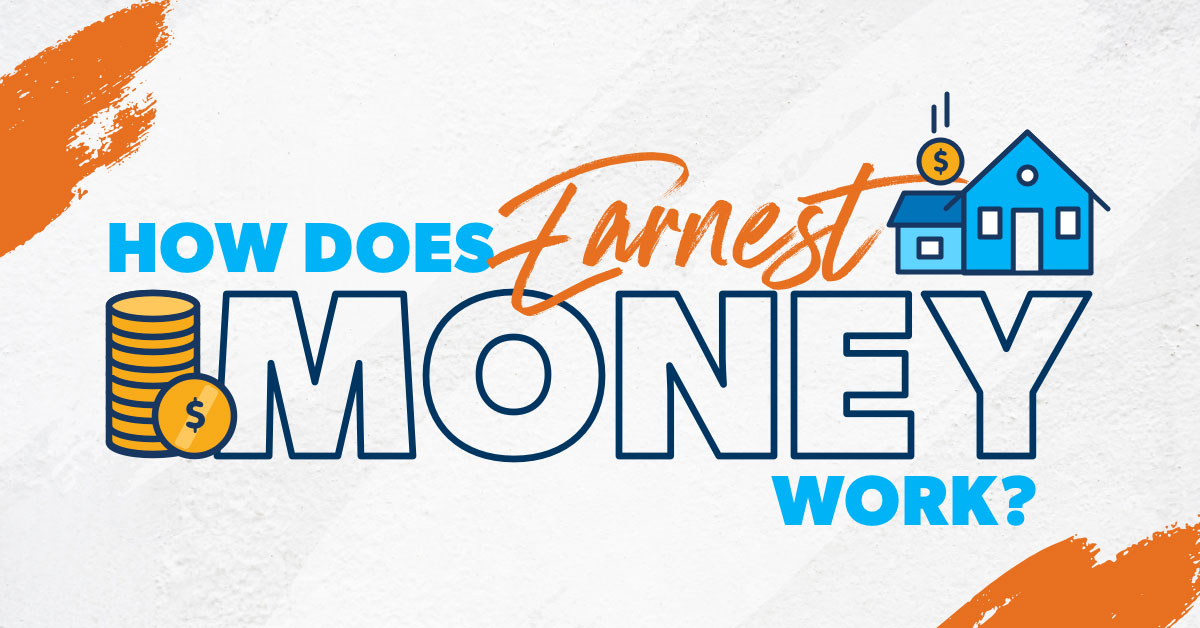What Is Earnest Money and How Much Should I Put Down?
7 Min Read | Mar 26, 2025

Key Takeaways
- Earnest money is a deposit (typically 1–3% of the home’s price) you include with your offer to show the seller you’re serious—or earnest.
- It’s held in an escrow account and applied to the down payment or closing costs if the sale is completed.
- The deposit protects the seller by offering compensation if the buyer backs out for reasons not covered in the contract.
If you’re new to the home-buying process, all the jargon can leave you feeling lost. Like, what the heck is escrow?
Find expert agents to help you buy your home.
Well, don’t worry. You don’t need an encyclopedic knowledge of real estate terms to buy a house, but earnest money is definitely one you should understand. That’s because earnest money could be the difference between getting the home of your dreams and having your offer rejected.
What Is Earnest Money?
When you make an offer to buy a house, earnest money is cash you include with your offer to show the seller you’re serious—or earnest.
Also called good faith money or a good faith deposit, earnest money secures your offer. In return, the seller takes their home off the market, makes it available for inspections, finishes any agreed-upon repairs, and lets the buyer know about anything bad relating to the house (also known as a disclosure statement) to help complete the sale.
Earnest money is usually 1–3% of the purchase price, but it could be as high as 10% in a hot real estate market. Sometimes it’s a fixed amount, like $5,000.
While you wait to close on your home, your earnest money goes into an escrow account that’s managed by a real estate brokerage or title company. This basically means that a third party will hold the money until the deal is finished. (Never give the money directly to the seller because you run the risk of losing it if the deal falls through.)
On closing day, your earnest money usually goes toward closing costs or your down payment (or both).
So, what if the deal goes sour? You can usually get your earnest money back, as long as your sales agreement has the right contingencies (aka conditions) laid out. (We’ll talk more about this later.)
How Much Earnest Money Should I Put Down?
The short answer is, you usually need 1–3% of the price you and the seller agree upon. But that isn’t always the case.
In some markets, you’ll need a fixed amount—like $1,000 or $5,000. In other communities, the focus is on the percentage. And in really hot real estate markets, like Silicon Valley, it’s not uncommon to see six-figure earnest money deposits.
Since that isn’t chump change, talk with your real estate agent about how much earnest money you should put down to help you play by the rules in your area.
Should I Pay Earnest Money?
Earnest money isn’t technically required, but it’s pretty much standard these days. If there’s any competition in your market at all, you’ll want to put down earnest money so a seller will take your offer seriously.
Basically, a good faith deposit is putting your money where your mouth is.
For example, let’s say Joe and Sally Smith find a house they love and make a $250,000 offer on it with $5,000 (2%) of earnest money. If the Johnson family also offers $250,000 with similar terms but no earnest money, the seller is more likely to accept the Smiths’ offer.
Once the seller accepts the offer, the Smiths have to cut a check for $5,000 that goes into escrow while their lender does all the prep work for their loan. In the meantime, the Smiths also pay to have the home inspected and appraised. If all goes according to plan, they’ll close on the home in 30 to 45 days, and their earnest money will be applied to their closing costs or down payment.
Is Earnest Money the Same as a Down Payment?
Now, before we move on, let’s make sure we’re clear—earnest money is not a down payment. A down payment is the portion of the total home price you pay before financing the rest with a mortgage. We recommend 10–20% of the purchase price of the home with a 15-year fixed-rate mortgage. (If you’re a first-time home buyer, a 5% down payment will work.)
Think of it this way: Earnest money makes your offer official, and a down payment helps make your purchase official.
But the earnest money you pay isn’t lost. When it’s time to close on your loan, you can choose to have your earnest money applied to your down payment or your closing costs.
When you’re figuring out how much money you'll need to buy a house, you don’t have to worry about saving extra for earnest money on top of what you already plan to save for closing costs. Earnest money is simply due up front when you make the offer, unlike the down payment and closing costs, which are due when you close on the home.
Do I Get My Earnest Money Back After Closing?
You may be asking yourself, Does my earnest money get refunded?
If everything goes the way it’s supposed to, the earnest money gets folded into your closing costs like bacon bits into pancake batter (trust us—it’s delicious). But you’ll need to be careful and read your contract because there are several ways you could lose your earnest money deposit.
Make sure your agent writes your contract so you can get your money back if something goes wrong. For example, if:
- The home doesn’t get appraised at the offer amount. Maybe you make a $200,000 offer on a home that turns out to be worth only $150,000.
- The home doesn’t pass the home inspection. The home could have significant structural damage or need a new roof, and you might not be able to come to an agreement with the seller to make the repairs.
- You can’t get financing. Things happen. Your lender could change ownership or you might encounter another hiccup in the finance process.
You’ll also want to pay attention to the deadlines in the contract. There will usually be a hard date for closing. But if it looks like it’ll take longer to figure out your financing than you thought, don’t worry! Your real estate agent can help you renegotiate the date to keep things moving smoothly and save that earnest money deposit.
And if you need help getting preapproved for a mortgage so you can make an offer on the home of your dreams, talk to our friends at Churchill Mortgage. They’re experts at navigating the mortgage lending process—credit score or not—and will truly put you first.
Your Guide to Finding an Affordable Home You Love
Learn our simple, step-by-step process to make closing on the right home for you easier and less stressful.
Can a Seller Keep My Earnest Money?
You can usually get your earnest money back if no one broke any contract rules, but keep in mind that there may come a time when you just need to walk away from the deal altogether. Something unexpected—like an accident, a divorce or a new job that causes you to rethink your entire life—could happen. In these cases, be prepared to walk away without your earnest money.
In hot markets, some buyers use a risky strategy to get a leg up on the competition and offer nonrefundable earnest money. That means the seller gets to keep the cash if the sale falls through for any reason. That’s right. Even if a UFO flies straight from Neptune to your future home and beams the whole thing up into the unknown, you’re out of luck.
Before you go for this tactic, talk to your real estate agent about your options and make sure you don't offer money you can't afford to lose.
Is Paying Earnest Money a Good Idea?
Earnest money protects both buyers and sellers from sketchy deals. If you’re a buyer, earnest money shows sellers you’re serious and helps you lock in a contract so the seller doesn’t decide to keep looking for another buyer.
And on the other side of things, earnest money protects sellers from a buyer pulling out of a deal just because they changed their mind. It's a win-win!
Next Steps
- Before you start shopping for a house, check out our mortgage calculator to see how much house you can afford.
- Get preapproved for a mortgage so sellers know you're a serious buyer.
- Work with a RamseyTrusted real estate agent. They can help you navigate the home-buying process in your local market and have proven track records of excellence.
Did you find this article helpful? Share it!

We Hear You!
We’re considering adding the ability to save articles to your Ramsey account.




